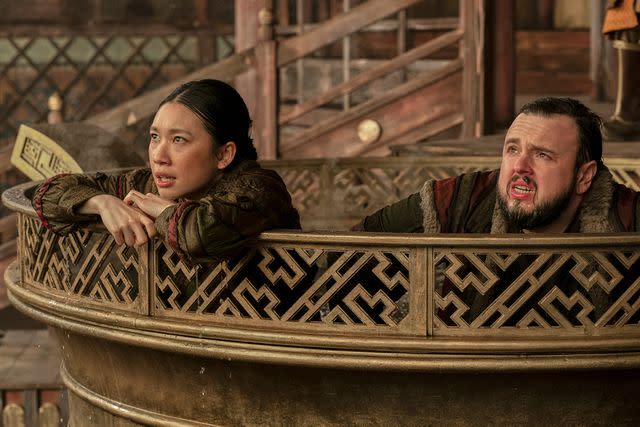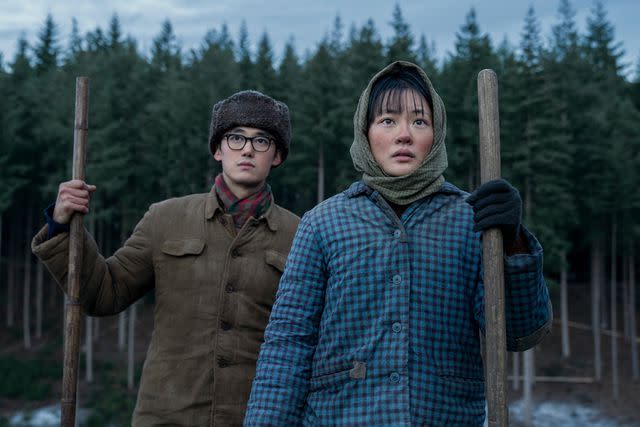“3 Body Problem” review: Netflix’s adaptation is a mismatch of compelling sci-fi ideas and boring characters
David Benioff and D.B. Weiss return to TV, but don't expect the smash success of "Game of Thrones."
Scale is always a problem for fantasy and science-fiction stories. When we sit down to watch movies or TV shows from such genres, we want to see big crazy things happen on screen — but if we can’t connect to the characters, then all the spectacle can pass by like a great fireworks display, without making any actual impact.
It therefore might be easy, in retrospect, to underrate the importance of the Game of Thrones opening title sequence. David Benioff and D.B. Weiss’ TV adaptation of George R.R. Martin’s fantasy novels was not a guaranteed success. But it became one of the most popular and influential shows of all-time partly because, on top of nailing the casting and production design, every episode began with an impossible-to-miss reminder of where everyone was, and roughly how far they all were from one another. That made it easy for viewers to keep up with the different levels of storytelling, and consistently contextualize the political machinations at Westeros’ southern capital against the slow approach of ice demons from the north.
Now, Benioff and Weiss are back with their first TV show since Game of Thrones ended in 2019. Together with Alexander Woo, they have adapted Chinese author Cixin Liu’s highly acclaimed sci-fi novel The Three-Body Problem for Netflix. Now, it would be unfair to make a 1:1 analogue between this project and their last, because there are many important differences, but the show also invites such comparisons! In addition to casting GOT stalwarts John Bradley, Liam Cunningham, and Jonathan Pryce in prominent roles, Weiss told EW in 2022 that 3 Body Problem “pushes a lot of the same buttons.” In any case, it’s helpful to keep GOT in mind when thinking about how 3 Body Problem fails to find the same balance of scale between larger-than-life ideas and human-sized characters.

Ed Miller/Netflix
Liu’s original novel (the first of a trilogy) is set almost entirely within China. It begins during one of the flashpoints of modern Chinese history, the Cultural Revolution of the mid-’60s, as young aspiring scientist Ye Wenjie watches her academic father get publicly murdered by an angry crowd as part of a “struggle session.” She herself is then sent to a labor camp in Mongolia, where the authorities eventually make use of her scientific expertise in an unexpected way.
All of that is present in the new show, down to a near-perfect replication of the opening scene. After that, things diverge. Liu’s novel moves from Ye’s activities in the ‘60s to the present day, where scientist Wang Miao and detective Da Shi are tasked with solving the suicides of many prominent scientists, including Ye’s daughter.
Benedict Wong plays a charming, cigarette-addicted intelligence operative roughly equivalent to Da Shi, but the Netflix show replaces Wang with an international group of scientist friends: Jin Cheng (Jess Hong), Saul Durand (Jovan Adepo), Augustina “Auggie” Salazar (Eiza Gonzalez), Jack Rooney (Bradley), and Will Downing (Alex Sharp). This decision seems like a reasonable attempt to render a heady sci-fi premise recognizable in the TV format. Not every significant deviation from source material is necessarily a bad thing; as Dune: Part Two director Denis Villeneuve recently told EW, "when you adapt, there's always some kind of violence toward the original material." Some of the characters are fleshed out and fun; Hong in particular is a highlight despite her relative lack of previous credits, and it’s nice to see Adepo again after his great turn in Babylon.

Ed Miller/Netflix
The problem is that these new characters are never integrated with Liu’s story in a way that makes sense. Instead of making the globe-spanning plot empathetic on a human level, these friends’ various interpersonal entanglements just end up feeling irrelevant in the face of the show’s big ideas. The fact that these characters are not part of the original story frees up Benioff, Weiss, and Woo to do whatever they want with them, and that leads to some genuinely shocking TV moments. But sometimes their fates just feel too far removed from important events happening further away — and, alas, the opening credits don’t do much to help you keep everything in context.
The Three-Body Problem’s focus on problem-solving and complex negotiation over spaceship battles or rebellious robots made it stand out from so many other sci-fi stories, and some of those fresh ideas come through on screen — particularly when the characters are playing a certain video game. But most of 3 Body Problem’s adaptation choices just feel like failed attempts to spice things up. Grade: C+
Sign up for Entertainment Weekly's free daily newsletter to get breaking TV news, exclusive first looks, recaps, reviews, interviews with your favorite stars, and more.
Related content:
Meet the Oxford 5: 3 Body Problem stars talk Game of Thrones fans, aliens, and more
The Three-Body Problem series 'pushes a lot of the same buttons' as Game of Thrones
Netflix faces criticism over Game of Thrones showrunners' Three-Body Problem series
Read the original article on Entertainment Weekly.

 Yahoo News
Yahoo News 
